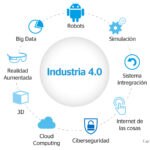The Spanish 4.0 Industry, hunting for talent
Beyond the myth or legend, companies are in the midst of digital transformation. And not only to survive, but also to compete. Through 3 examples and 2 institutions, the new challenges of these 4.0 industries are analysed.

The digital transformation of the Spanish industry emerges. Companies want to go digital by using big data, machine learning or artificial intelligence to be competitive, scalable and profitable. Leaving technological advances aside, experts stress that people do not disappear, and that the transformation must be led by talent.
Technology, collaboration and talent. These are the 3 key pillars of the 4.0 Industry for Pablo Oliete, president of Comisión Industria 4.0 of AMETIC. Thus, Oliete defined it as "the adoption of the Internet of things in the industrial process thanks to the massive introduction of 'cyber-physical' systems."
Industrial objects connected to sensors allow to forestall problems, predict behaviours or react in real-time conditions by having updated information although, according to the AEMETIC representative, technology by itself will not ensure the success of the 4.0 Industry. "We need leadership and people getting involved because talent is the most important pillar in the digital economy" he said.

Transformation in companies
In 2014, the turnover of the 4.0 industries reached 2,575 million euros. A figure that aims to reach 14,500 million euros in 2024, according to data offered in the Vivir en un Mar de Datos event (Living in a Sea of Data), organised by Fundación Telefónica.
"The new economy, a result of the digital revolution, will eventually and strongly improve productivity and boost growth and welfare," stated, in this regard, BBVA's Chairman Francisco González, in an article published in El Mundo newspaper. In his opinion, "the adjustment process will not be a smooth one, and can be painful for many companies and sectors."
It is the essence of the digital transformation that is taking place throughout the business environment. González stressed how customers are changing. "They demand new services and other ways to access them. And hundreds –or thousands– of startups, newly created companies, are already addressing this need. "
González pointed out, as another key in the new 4.0 industry, the effort to place the customer at the heart, thus creating a new and better customer experience. In the last 5 years, BBVA is reinforcing itself in this regard, strengthening this type of strategy and adding the efforts of startups with which it is working.
On this vein, the speech of BBVA's CEO, Carlos Torres Vila, at the Money 20/20 Europe meeting, contributed to this digital revolution: "BBVA will play an increasingly important role in the innovation ecosystem thanks to our internal initiatives, strategic alliances with fintech players and the use our platform by building open APIs, as a lever for growth."

And this is a step taking place across companies in all sectors In fact, in many cases, the traditional process, in which nothing was automated, is being replaced by full digitisation. As it is the case, for example, in Sesderma's pharmaceutical laboratory, which took the leap towards digitisation when they realised customers wanted customised products.
The common theme of many of these companies lies on placing the customer at the heart of any strategy and asking what they want. In the case of Sesderma, they saw that customers "were technological and wanted to have as much information as possible on products. They also wanted to buy them now and wanted to customise them. We had to be flexible and agile."
Therefore, the director of Operations of the laboratory, Josep Vento, noted that the basis of this digital transformation in the business sectors are people. "You have to communicate to workers that we have to take the leap to such technology that allows us to get an overview of what happens in our business in real time. We seek full interconnection. "
In his view, the path to transformation is long –4 years in his case– but without traumas, although digital transformation in Spain takes time. "Only 19% of CEOs of the companies lead digital change compared to 34% around the world," he said during Living in a sea of data.
Digitisation as an act of survival
People are also the cornerstone in the Burgos based company Asti robotics. Rubén Martínez, head of Marketing and Communications, pointed out that the digitisation of industries is not a strategy, although it is necessary for survival.
In this case, Asti has taken the leap from the town of Madrigalejo del Monte to dozens of countries. For example, it has completely robotised one of Nestle's plants in the United States. In this sense, one of the hurdles has been the search for talent. "Technology has arrived but it takes preparation and people willing to participate in that process."
Almudena Moreno, Business Developer at Telefónica Open Future, said in this regard that "80% of the jobs in the coming years will have a technological component, 4.0 talent will be needed".
And where are those people? Everyone agrees that universities are not the place to look for them, as they live with their backs turned to reality, in their own world. Hence, companies have to go out and look for such talent. At this point, they conclude, we must demand more political commitment to ensure the final leap towards the 4.0 Industry.